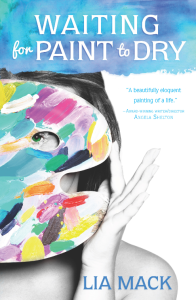Please welcome author and sexual abuse survivor supporter Lia Mack as she shares about writing what scares you.

I love the idea of cutting into myself with an Exacto knife, little by little, slice by slice, until the entrails of my being are released, splayed and displayed out in the open.
No longer hidden by the depths of my body, before me is the rawness of myself. My guts.
Gutted, I am raw. Open. Vulnerable. Real.
I’m speaking figuratively, of course, those who are feeling weak in the knees.
Don’t puke, yet…
Let me explain.
I read it somewhere that writing is akin to bleeding or vomiting or both. Again, figuratively speaking.
Now, I totally agree that writing is vomiting. It’s exactly how I feel while I’m throwing words up onto a page. Just write as the words come, no censoring, no editing. Just write! Vomiting is first drafts. Vomiting is the only way to just get it done.
Bleeding, on the other hand, is editing. And we all know that good writing doesn’t come from vomiting words onto a page. Good writing comes from cutting into those words and killing off your darlings. And if you don’t know what I’m talking about when I say killing your darlings, you need to read Stephen King’s writing craft book On Writing. Read it. I can’t help you if you don’t help yourself.
So, we are told that, in order to write, we need to first vomit and then bleed. Two very unique actions. Two very pertinent requirements in the craft of writing. However, two very involuntary actions unless you first gut yourself.
When you vomit, when you bleed, yes, something has to happen to create that action. There has to be a want, a need to vomit or bleed.
I have to write.
I need to write.
We’ve all said these words a million times and will say them a million times more. And it’s because we can’t go another second without writing something, anything! And that’s good. If you don’t write, you can’t be a writer. Writers write. It’s what we do.
However, again, these two actions – vomiting, bleeding – won’t do anything for your writing unless you have a source from which to vomit, a source from which you can bleed.
And this source is your guts.
I’m not making this up. Your guts is where your life, your love, your hate, your power, your lies, your fear, your everything lives. It’s all there. And like it or not, without your guts you wouldn’t be.
Your guts are the source from which the rawness of yourself resides. It’s the sticky, dark, vulnerability from which you feel, want, desire. It’s that place inside yourself that you don’t talk about. At least, not to anyone real. You might talk about it to yourself, and that right there is probably something you keep to yourself, too, in your guts.
Just think about it. Writers are a tad bit on the, shall we say, not-so-ordinary side? And some, if not all of us talk to ourselves and/or our characters, out loud. In the open. Most of us hide this side of ourselves, but what if we didn’t? What if, for a moment, you were to walk out into the open and start up your usual ol’conversation with yourself and your characters? Talking it out. Hashing out some plot hole. Rehearsing some dialogue.
Go ahead. Do it. Go out into public and do it. I’ll wait.
Seriously. Where ever you are… Go. Do. It. Now.
Feel the Clench
Did you feel that? Did you feel that nervousness, that fear in your gut? If you didn’t, that’s because you weren’t going to do it. So do it now.
Let’s see you’re bravery!
Let’s see your vitality!
Let’s see your don’t-give-a-shit’ness because you’re better than all us cowards and you can easily go out in the open and talk freely to yourself!
Do it!
You can’t can you? You’re all talk and a coward just like the rest of us. But you felt it, that fear, anxiety, that excitement. You felt it, didn’t you?
Yes, your heart is beating fast, now. Yes, your stomach is tied up in knots, now. But what happened before that? What did you feel first?
If you can’t answer that because you didn’t feel it, try it again. Put yourself out there. Wear that tight skirt and flaunt it. Pick up that microphone and sing. Take up that bullhorn and shout into a crowd of your peers or total gawking strangers.
That split second before the lights go up… That split second before the eyes are all on you… what do you feel?
It’s quick, so you have to pay very close attention to your body to feel it…
Do something that scares the shit out of you and tell me where you feel something first…
It’s your guts, isn’t it?
And, no. That’s not a question. That’s a sly-smiled, head-nodding statement to the fact that you felt it and know it now too. That clench – that tight hold down deep. That’s the source of all that is you. Your fear, your angst, your desire, your want, your need. No matter where those emotions may take you – vomiting, bleeding, loving, flying – it all starts in your guts.
So, now that you’ve dissected your emotions to find your true core – your guts – let’s do something fun.
Tearing into Yourself
Gutting yourself is not pretty. It’s not easy either. When I started venturing out into the world of critique groups with my first manuscript, I thought what I’d hear back was the usual fix this, fix that. And I did. I’m no good with grammer. Or spelling.
But what I didn’t expect to hear was that my manuscript was nice.
Nice…
The goal with my novel Waiting for Paint to Dry was to reveal one woman’s quest for inner peace amidst deep depression and suicidal contemplation by bringing her to a point where she has to take back her life from the grips of PTSD due being raped, or lose her life all together.
Nice ain’t anwhere in that healing journey.
Not until the end anyway, when she stumbles into love… I am a true love junkie. But I digress.
Nice was death to the honesty that I wanted to show and share. My novel, although not a memoir, is a fictionalized representation of my own healing journey back from the dark spots of my life. But it was good that my critique partners thought it was nice that I added in a rape scene. It was good to feel the clench in my guts when they said it was nice that my character was afraid to fly home to resolve her past. They didn’t get it because they didn’t feel it. And that was all my fault. I hadn’t put enough emotion into it, or any emotion!
I hadn’t been honest. I hadn’t dug deep. I hadn’t put myself in the way of fear and gutted myself. I hadn’t found my vulnerability and spread it out thin to find the pin points of exactly where my character needed to find freedom.
But I was afraid to be honest.
I was afraid to tell the truth.
Good.
That’s just where I needed to be. Afraid to tell the truth. It was the best starting point to tell the truth because it was from here that I found my guts. And boy did I feel them. I was nervous. I was shy. I didn’t want to relive the dark spots. I only wanted to feel the light.
So I went back to Stephen King’s On Writing. Yes. This is the book to read when you are learning and relearning the craft of writing. I reread what Stephen King says, that “Writing is not a church. It’s not your family. It’s not politically correct. It’s writing. Tell the truth.” (I’m paraphrasing of course.)
Tell the truth.
It only took three little words to make me realize what I had to do. I had to use the clench. I had to utilize the fear. I had to feel it and write it from my guts. And telling the truth made it churn for sure. I made a poster of paper and markers and taped TELL THE TRUTH to the wall above my writing desk. TELL THE TRUTH surrounded me everywhere I went, every word I wrote. If at any time I felt it was nice I deleted it. Went back inside, deep into my guts and found the truth.
And it hurt. Oh, my God, did it hurt. I wrote. I cried. I wrote and cried some more. I found truths that not even my years of therapy had found. I wrote and then deleted the truth sometimes too. It was too much. Too raw. Too real.
But then I’d write it back in, after taking some time to get used to the pain. The suffering. The dredging up of my past and my sorrow and my journey and my pain. It was real and it was honest. And it made my character come so alive that I cried and cried some more. She was real. So was her pain. And she made it. She made it out of the darkness and into the light.
I knew I had gutted myself right when I had to reread and edit and reread and edit the manuscript again and again when my editor and publisher sent it back with edits. I knew I would have to reread my manuscript many times over to get it right, but I had no idea that I was going to also relive the emotional journey I had gutted into my character’s life. But it was validating. And an eye opener. If I didn’t feel, if I didn’t cry, if I didn’t laugh out loud when I read something that should have made me feel something so strong as to ignite a physical reaction, I dug deep. I peered down into myself and reached for that morsel that had been hiding.
Truth.
Honesty.
I pulled it up out of me and laid it on the page. If it hurt, if it felt real, I knew I had gutted myself right. I knew I had found the right mix of raw emotion so that my character’s emotional journey would translate to my reader.
If you don’t laugh out loud and cry your heart out when you’re reading your manuscript, you haven’t gutted yourself enough yet.
So reach down. Drag it out. Dissect it. Claw at it with your knife. And if you have no clue how your character should feel because it’s not something you yourself have lived through yourself, you need to do some research, soul searching and ask others how they feel.
Find the root. Find the guts. It’s the best way to use raw emotion for your writing.
About the Author:
 In addition to her debut novel Waiting for Paint to Dry, Lia Mack’s creative non-fiction has been seen in such publications as The Washington Post, Nickelodeon Jr. Magazine, Advances in Bereavement Magazine and Nesting Magazine. She is also a guest blogger at award-winning writer/director Angela Shelton’s SurvivorManual.com, a blog dedicated to inspiring and empowering sexual abuse survivors. You can visit Lia online at www.LiaMack.com.
In addition to her debut novel Waiting for Paint to Dry, Lia Mack’s creative non-fiction has been seen in such publications as The Washington Post, Nickelodeon Jr. Magazine, Advances in Bereavement Magazine and Nesting Magazine. She is also a guest blogger at award-winning writer/director Angela Shelton’s SurvivorManual.com, a blog dedicated to inspiring and empowering sexual abuse survivors. You can visit Lia online at www.LiaMack.com.
Website | Facebook | Twitter | Pinterest | Instagram
Her Book:
